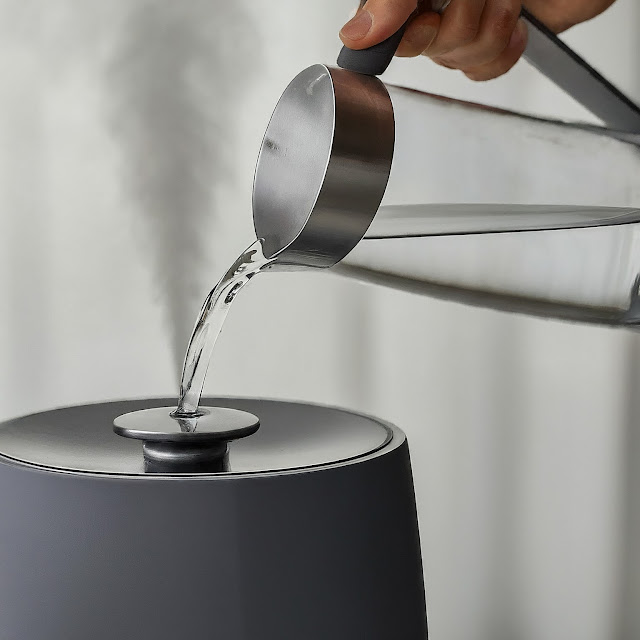Humidifiers are fantastic little machines that add much-needed moisture to the air, especially during dry winter months. They can soothe coughs, ease congestion, and even improve sleep quality. But with so many options on the market, a crucial question arises: "What water to use in humidifier?" Choosing the right water can significantly impact your humidifier's performance and your overall well-being. Let's delve into the world of humidifier water and explore the best options for a happy and healthy home.
Understanding How Humidifiers Work: It's All About the Mist
Humidifiers work by releasing a cool or warm mist into the air, increasing the overall moisture level. This can be a lifesaver for those suffering from dry skin, irritated sinuses, or respiratory problems. However, the type of water used plays a vital role in the quality of the mist and the overall effectiveness of your humidifier.
Tap Water Troubles: Why It Might Not Be the Best "What Water to Use in Humidifier"
Tap water might seem like the most convenient option for "what water to use in humidifier." After all, it's readily available. However, there are some potential drawbacks to consider:
- Mineral Buildup: Tap water often contains minerals like calcium and magnesium, which can leave behind white dust as the mist evaporates. This "white dust" can settle on furniture and irritate airways.
- Bacteria Growth: If not properly maintained, tap water in a humidifier can become a breeding ground for bacteria, potentially releasing harmful particles into the air you breathe.
Bottled Water Bonanza: A Convenient, But Not Perfect, "What Water to Use in Humidifier" Choice
Bottled water offers a readily available and seemingly cleaner option for "what water to use in humidifier." While it eliminates the mineral buildup issue associated with tap water, there are still some things to keep in mind:
- Cost: Continuously using bottled water for your humidifier can become quite expensive, especially for larger units.
- Environmental Impact: The plastic waste generated from purchasing bottled water can be significant.
Distilled Water: The Champion for "What Water to Use in Humidifier"?
Distilled water emerges as a popular contender for "what water to use in humidifier." Here's why:
- Mineral-Free: The distillation process removes minerals like calcium and magnesium, eliminating white dust concerns.
- Reduced Bacteria Growth: Distilled water provides a less hospitable environment for bacteria growth compared to tap water.
While distilled water appears to be the ideal solution, there's a slight caveat:
- Mineral Loss: Distillation removes not just potentially problematic minerals but also some potentially beneficial ones.
The "What Water to Use in Humidifier" Dilemma: Finding the Perfect Balance
So, what's the ultimate answer to the "what water to use in humidifier" question? The truth is, there's no single perfect answer. Here's a breakdown of the options and how to choose the best fit for you:
- Tap Water: If you're on a tight budget and don't mind the potential for white dust, tap water can work. Just ensure regular cleaning to prevent bacteria growth.
- Bottled Water: For occasional use or travel-sized humidifiers, bottled water can be a convenient option. However, consider the cost and environmental impact for long-term use.
- Distilled Water: Distilled water offers the cleanest mist and minimizes white dust. However, if you're concerned about the lack of minerals, consider the next option.
The Compromise Champion: Demineralized Water – A Happy Medium
Demineralized water offers a middle ground for the "what water to use in humidifier" dilemma. This type of water undergoes a filtration process that removes most minerals but might retain some beneficial trace elements. This can be a good option for those who want to avoid white dust but aren't comfortable with the complete lack of minerals in distilled water.
Beyond Water Choice: Essential Tips for Optimal Humidifier Use
No matter "what water to use in humidifier" you choose, here are some additional tips for optimal performance and safety:
- Regular Cleaning: Clean your humidifier regularly according to the manufacturer's instructions to prevent bacteria growth.
- Distilled Water and Cleaning: If you use distilled water, it's still important to clean your humidifier regularly to remove any mineral deposits that might accumulate from the environment.
- Maintain Ideal Humidity Levels: Aim for a humidity level between 30% and 50% to avoid encouraging mold growth.






No comments:
Post a Comment